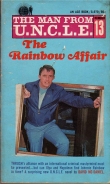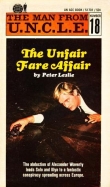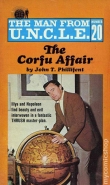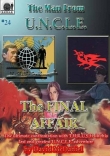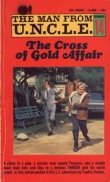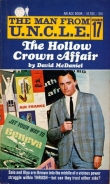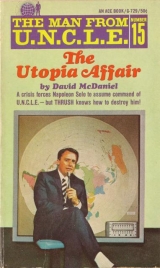
Текст книги "The Utopia Affair"
Автор книги: David McDaniel
Жанры:
Боевики
,сообщить о нарушении
Текущая страница: 7 (всего у книги 9 страниц)
Chapter 12
"You Really Blew It, Didn't You?"
MR. ALDERSON'S usual broad smile was tempered with polite concern as he laid the long strip of computer printout across the desk. "I'm sorry to say your attack has started to crumble, Mr. Dodgson. The delay in bringing up your ground forces left your air cavalry without enough support to hold the third sector."
Waverly leaned forward to examine the list of hypothetical casualties and equipment losses. "And my retreat to Area B went off well?"
"Oh yes. According to the logistic program, he couldn't get any infrared tracking equipment airborne in time to determine your destination after dusk fell. Of course he could guess or assume your bivouac area."
"The troops are ready if he does. I chose Area B be cause it would give us time to entrench."
"Uh-huh. The factor has already been entered in case there should be a conflict tonight. Oh, technically, the reason for the attack delay this afternoon was sabotage—slowing down your armor and infantry."
"Sabotage?"
"Well, in Monday's final set of orders you applied six units to camp security without specification. He applied twenty-five to sabotage, with transportation specified. That portion of his order was held by the computer for the usual period and would be in your brief tomorrow morning as a matter of routine discovery. I happened to be working when the random interval timer released the news that one of your six security units had connected—in effect, your staff discovered that most of your gasoline was polluted. But of course it had already taken it into account in your move order, so your armored didn't make it, and most of your infantry was stranded where you picked them up later."
"I see. What about the aircav? They didn't seem to have fuel problems."
"If you remember, the last time you used them was Saturday afternoon. Sunday their tanks were considered to have been refilled, so the computer decided they were unlikely to have been tampered with. At a guess, I'd say that would've taken at least fifty applied units." He rolled on down the paper to an odd pattern of scattered symbols.
"Anyway, here's the current disposition of your forces. I'll set it up…" The Gamesmaster slipped the paper through a long narrow slot, and a lighted screen appeared in projection. As he adjusted the paper's position, the scattered symbols appeared over a map of the imaginary battleground which was represented by a few square miles of Utopia's vast parkland. When the four registration dots were set at the corners the overlay was locked in place and Waverly began to discuss the way the battle had gone. Alderson's concern over his loss was directed more towards the practical aspects of the Game—had anything not been made clear, were the computer's decisions unrealistic, had anything not seemed fair. The Game was his child and he couldn't help worrying about its development; he admitted this was only the fourth full-scale Game that had been played, and he kept expecting things to go wrong.
His sympathy for a losing player was purely theoretical, however, and never could he have been tricked or enticed into giving a word of advice on the play, though he was always available for interpretation of a rule or an explanation of the Game's relation to real war. Since it was his creation, he could no more have given either player an unfair advantage than he could have infringed his own rules, and the Game meant more to him than did the players. But he was always eager to help them understand it, and Waverly preferred to have the inventor explain and analyze the results of each semi-hypothetical battle. He coded his own orders twice a day and fed them into the Battle Results Computer personally. Trust no one and fear no one had been his motto in this game.
As he studied the map he muttered to himself. "I doubt if he'll want to press the attack by night, since he's in a defensive position. I'll leave a set of orders for the contingency, but otherwise I'll shift around in the morning. My replacement credit is adequate; I can afford to cover my losses and even bring in some fresh troops…" He glanced at another part of the printout sheet. "Did the computer decide whether the equipment that was sabotaged would require extensive repairs before re-use?"
"No problem. Basically, a vehicular attrition factor will be balanced against your distance allotment for the first two moves tomorrow."
"I'll need those moves to prepare for him to press his advantage."
"Well, more than likely," said Alderson noncommittally. Waverly leaned back and began to study the map. His situation was, in somebody's words, hopeless, but not serious. The Game wasn't going well, and only the most daring, cautious, innovative play could see him through. In other words, he was home.
Illya had to admit they'd given him no warning. They must have suspected some time in the past, but not a word of any value to him had passed between the two Thrush assassins in his hearing for several days. Yet their behavior otherwise had been perfectly normal. Professionally he recognized and saluted their competency; personally there was the blow that always comes with having been outdone; and in one corner of his mind was the relief that said he would have one less tape to scan each night now.
He knew after he transmitted the keying signal three times that his bug in the Thrush Suite would never be heard from again. Like the dog in the nighttime, its silence told him much. The murderously talented pair were now aware of the real reason for the failure of their earlier impromptu attempts on Waverly's life, and were faced with two choices. They could continue their cover occupations with the Grounds Staff, watching to see who was likely to be watching them, or they could go underground, leave their jobs and room and be free to strike when and where they pleased.
It would be easy enough to find out whether they were at work tomorrow. Greta, the head maid for this wing of Staff Quarters, would know if their room had been vacant. And Curley Burke would know if any worker in the Park hadn't shown up and probably why. Friends, Illya reflected as he folded the slender ear phones and set them lightly in their grooves in the case, were handy things to have. Why, I've got friends I haven't even used yet, he quoted mentally, and added, But I'll need every one of them if the Deadly Duo should ever suspect who I am.
"This is Greaves, speaking for Central. Project Waterloo is proceeding according to schedule, Dr. Pike. You must prepare a target date no later than November Thirtieth for the climactic operation of Phase Two. Waverly has been located and the length of his stay has been determined. If you are to crack Solo you must act by this deadline. Waverly will be resuming control of the United Network Command on Monday December Eleventh, and Central desires at least ten days in which to take full advantage of the confusion that will accompany Solo's collapse."
1511672039 Z DE: WATERLOO TO: CENTRAL PHASE TWO TARGET DATE 26 NOVEMBER.
1511672312 Z DE: WATERLOO TO; TADPOLE PRIORITY BLUE Q: HAVE YOUR SUBS BEEN SIGHTED BY UNCLE YET. IF NOT WHY NOT. END.
1711671507 Z DE: WATERLOO TO; NEW YORK PRIORITY BLUE HEY HARV REMEMBER THAT IDEA WE WORKED OUT FOR GETTING SOLO OFF HIS SWIVEL CHAIR WITHOUT RISKING A DIME :Q. THE FRUITS ARE RIPE FOR PICKING NEXT WEEKEND THE 25-26. LOVE TO ALL ROGER. END.
1811670148 Z DE: WATERLOO TO: HONG KONG PRIORITY BLUE YOU ARE DIRECTED TO ORGANIZE AND SUSTAIN A MAJOR RIOT AROUND UNCLE HQ HONG KONG FROM 1930 LOCAL 22 NOVEMBER UNTIL COUNTERMANDED OR UNTIL YOUR FORCE SUFFERS 50 PER CENT CASUALTIES. FURTHER ORDERS FOLLOW. END.
1811671523 Z DE: WATERLOO TO: BOGEY PRI ORITY BLUE REQUE INTERCEPT INTERCEPT INTERCEPT UCR PROJECT BOGEY IS PRIORITY WHITE AND IS NOT ON YOUR CLEARANCE. Q: WHAT IS YOUR SOURCE OF DATA ON SAME.
DE; PIKE TO: ULCOMP I HAVE PERSONAL CLEARANCE ON BOGEY AND WISH TO REQUEST DATA ON THE STATE OF THE PROJECT.
UCR NOT IN YOUR PROVINCE. ONLY COUNCIL MAY OVERRIDE DIRECTIVE.
Roger read the screen over Dr. Pike's shoulder and nudged Helena. "I told him he couldn't slip one past the Computer. That thing in Manitoba must be the biggest surprise package since Christmas, and Central doesn't want anybody fooling around with it."
Helena arched an eyebrow. "Maybe so, but if you've been following the tabloids you'll notice that it's in operation when we really need it. Central may seem overcautious, but they know what's going on. Don't you ever forget that."
A red copy of the message hit Solo's desk within ninety seconds after the intelligence report bad been deciphered. His suspicions had been correct—the leaders of every Thrush satrap in the northeastern United States were coming together in New York in 48 hours.
In the guise of a businessman's association meeting, this two-day conference would place dozens of key men in direct contact to arrange the countless interactions that made their operations practical. It would also place them in a spot where he could eavesdrop until he had learned enough to bring legal action against them, and then move in. There was every reason to believe they would put up a fight, and Napoleon had every intention of giving them one. For a week now, as other operations had slacked off, he'd been putting more and more field agents on standby as evidence of the planned meeting began to accumulate.
He tapped a code on the keyboard at his left elbow and a floor plan of the hotel faded up on a back-illuminated screen set in the desk top. He leaned forward and began to study it defensively. Where would he place plainclothes guards around a conference? What coverage would they have? What kind of attack would they be expecting? All he had to do was to be one step smarter than the sharpest planners Thrush had at their disposal—and probably the Ultimate Computer as well.
His earlier studies of the plans had left him only one choice—a frontal attack. Without looking, he keyed the intercom. "Miss Williamson, set up a briefing session here in twenty minutes. We're going to hit that Thrush conference Sunday night. You may tell them I will head the attack personally. And get Section Four up here first—I'm going to want a hotel suite bugged."
2711670502 Z DE: NEW YORK TO: WATERLOO
ROGER BABY IT WORKED LIKE A DREAM. OUR CASUALTIES TOTALLED SIXTEEN, NO PRISONERS, NOBODY LEFT BEHIND. IT WAS WORTH IT TO SEE SOLOS FACE THOUGH WHEN HE KICKED IN THE DOOR. THANK ME FOR HAVING THE PHOTOGRAPHER READY. YOU CAN SEE HIM TOO WHEN I SEND YOUR TEAM THREE EIGHT BY TEN GLOSSY PRINTS. WHEN WE TAKEOVER YOU CAN HAVE HIS OFFICE. MARV. END.
The hardest part was the long walk past the glass windows of the main communications room. It was soundproof, but he could feel the silence fall among the girls when he appeared. He walked steadily erect, eyes on the door at the far end, jaw set, not a flicker of expression hinting at the hard cold knot just under his stomach. The only sounds in the corridor were the whisper of the air conditioning and the rhythmic tap of his shoes, but he could almost hear murmurs. "He found what?" "You're kidding!" "And that's what he was doing when Manitoba blew up?" "Wow! He really blew it, didn't he?"
He didn't sag a millimeter until he heard the door slide closed behind him, but his knees started to shake just as he reached the desk and he had to lean against it for a moment before easing himself into his chair. Who would be taking over if he removed himself from command? He couldn't think of any field agent with the necessary understanding of the range of U.N.C.L.E.'s activities—he'd probably just better call on Carlo Amalfi or Jorge da Silva, request they coordinate operations for North America along with Europe or South America, whichever of them would take on his defaulted responsibility. All he had to do was admit he couldn't handle the job.
He couldn't. He'd called out the full force available on a wild goose chase, made a fool of himself in front of dozens of his men, and in the process had let slip enough control over everything else to bring simultaneous disaster on half a dozen operations around the world.
There was Askandi, for instance. If he could have received the support he'd called for in time, be probably would still be alive. He'd gotten the data he'd been sent after—the minisubs had been using the whaling factory ship as a floating submarine pen with maintenance and refueling capacity for a dozen of the speedy little killers. But the ship and its cargo had gotten away, and a good agent had been killed. Which might not have happened if Napoleon Solo had been at his desk, where he was supposed to be, instead of all the way across Manhattan in the middle of a gunbattle just because he was feeling bored!
And of course the Flin Flon Monster had broken loose just about the moment he'd charged into the hotel suite, guns blazing all around him from a vast force of plainclothes and uniformed Thrush and his own small army of battle-tough U.N.C.L.E. men. The fight around the suite had been pitched and bloody, and had kept both sides thoroughly occupied for the better part of an hour. But the suite was a cul-de-sac, chosen by Thrush for defendability. No windows, only one door, and an en closed ventilating duct which Solo had taken the precaution of riveting closed. It was a perfect trap, and at the time had seemed perfectly reasonable.
The concealed microphones in the various rooms of the suite were picking up conversations in many voices, full of phrases like "... expanding into the solid-state device line, we could carry your full catalogue of… suppose I do; could you arrange to loan me a good assassin from one of... fiscal 1966 used 18 percent more computer time than... chick comes in from Central and flashes on me, so I have to fast-talk her into..." Hidden tape decks turned, and conferral went on while silenced gunfire plopped and thudded back and forth along the ornate halls.
At last the guards fell back and Napoleon charged forward, his men behind him, to kick in the door of the suite and stumble to a dazed halt in the center of the room, listening to a babble of voices from two small tape recorders playing their canned conversations. He stood in surprise at first, shock and understanding growing while the first two men in after him turned the machines off. Then they had gone through every room in the suite, turning off the other portable tape recorders which had been talking to the concealed microphones for at least an hour and a half.
As the voices died one by one, he became aware of the twittering of his pocket communicator. Slowly, unwillingly, he took it out, the beginnings of a full awful awareness growing as he realized what must await him on the other end.
"Solo here."
"There are a number of top priority calls on Channel D and several more on other lines. Would you like to handle them now?"
And then the delayed messages began to come through. Flin Flon. Clipperton Island. Tierra Caliente. Cleveland. Denver—well, that had come out all right. Anchorage meant six months of careful preparation blown and a good agent in the hospital. Hong Kong was still holding, and the attack had finally fallen off again, but he didn't learn that for a while.
He stood there in the hotel room, words falling about him telling of disasters of every description. At last he turned without a word, got back into his limousine and rode back to U.N.C.L.E. Headquarters in silence. For part of the long crosstown journey he wondered about suicide, but ruled it out. Now that he knew the news had preceded him, he wondered seriously about resigning his command. Carlo had run things across the Atlantic before for short periods, and Waverly would be back in two weeks.
He looked up from the desk as the door sighed open and Miss Williamson came in at her usual graceful pace. She set a stack of folders and a spool of film on his desk, straightened and looked him in the eye.
"You really blew it this time, didn't you?" she said matter-of-factly.
He looked up at her for several seconds. "Yes," he said at last. "I guess I did."
Section IV "The Pride Of Utopia."
Chapter 13
"You Knew The Job Was Dangerous When You Took It."
SILVERTHORNE had a regular luncheon date with his opponent in the war game, and Dodgson seemed to find their meetings stimulating. So much so that Silverthorne was confident he would be on the dining terrace at the usual time, vacating his office shortly past noon. Silverthorne had also made it an irregular practice to arrive late, as he would this time, though normally he was precisely punctual.
When Dodgson left his office at 12:06, Silverthorne was just around the corner of the hall, watching. The brisk, sturdy figure walked out the open door into the bright spring sunshine and vanished up the graveled walk, and moments later the thin dark watcher drifted out of the shadows and moved quietly to the just-locked door. With the tip of a short ribbon of spring steel he attacked the bolt, shielding his work with his body so any passerby would have seen only a man fumbling with his key.
In seconds the action yielded to his touch and the door eased open. He looked around the small, spartan room. Where would it be? The desk? His glance settled and he moved to follow it. Top drawer? Second? Third? They opened and closed before his search, but revealed only a few small personal items. If Dodgson was to have any hope of gaining a winning advantage before the game's end, he must have made some notes. The action of the game was too complex for even a mind like this man's to carry around in ready memory.
Standing up, he sent his searching gaze swiftly around the room. There—on a shelf lying in plain sight though half-hidden behind the door, the faded brown dust jacket. The book of mystery fiction with the hollow center. He had only moments—Dodgson might wonder if he was more than a few minutes late. There were no other obvious or reasonable hiding places in the room.
Quickly he stepped across the office and picked it up, flipping open the cover. The hollow was empty. He shook it, turned the volume over and checked the spine. The broken back of the old book gaped open and empty. Then if the plan was not here—could it be that he really didn't have one after all and would go into battle this afternoon essentially unprepared? The mere fact of the book's presence in the office confirmed his suspicion that it related to Dodgson's war effort as a secret safe. Could he have carried the plans on his person? He wouldn't have brought the book if he hadn't needed its services—or expected to need them. It would not be impossible for him to play the action by ear, since they had both opted to supervise the approaching battle personally rather than let the computer adjust the forces within the limits of their basic orders and without imagination, but did he really expect to be able to juggle and coordinate the fantastically complex scheme of play improvisatorially?
Then he knew what to do. Dodgson had studied his style of play, his habitual placement of forces; it was time to switch. Use direct confrontation, perhaps feint at his supply lines first—After all, Silverthorne thought, I am already in a winning position and fighting an essentially defensive campaign…
Plans were forming in his mind as he let himself out of the office, restored the latch to its proper condition and hurried off to keep his luncheon date with his friend and enemy.
Well, they'd vacated their quarters, but nobody minded because they had three days off. Three days—in that time they could have a dozen chances to kill Waverly. And he didn't even know where they were. Illya brooded in the corner of the kitchen, his uniform and mood a patch of black among the gleaming utensils. He was off duty in another ten minutes, but until then he had to stand ready to hop into the electric cart and wheel off to deliver a meal or a few bottles. He had played many roles without complaint during his years with U.N.C.L.E. and before, but few were as difficult to maintain as six weeks of subservience.
The hands of his watch crawled around, snipping the last minutes off the hour, one by one, until at last he looked up to see Andreas, his replacement, coming on duty. They exchanged the usual pleasantries until Illya yawned politely and Andreas bid him a good evening.
There was only one way to draw them out—he'd have to offer himself as a target. His conservative soul shrank from the idea, but it was the only one practicable at the moment, and the need was pressing. All he could do was attract their attention, and then stand ready to move very fast.
He'd go to their room as if to examine his mysteriously silenced bug. If they were looking for their secret friend, they'd find him. He decided to eat lightly and do a few warm-up exercises before he went in. He debated carrying a pistol, a knife or a weighted stick, and finally compromised on all three. Bound by the order not to let anybody get killed if he could help it, his U.N.C.L.E. Special carried only the knockout darts. Illya wished heartily for a sturdier arm like the Webley-Vickers 50/80 machine pistol, but the word for this mission was still Don't Make Waves. He took the note addressed to Curley out of his drawer and propped it up on the desk just before he turned out the light and left.
A popular film was being shown in the employee auditorium this evening, and the halls were nearly deserted. The elevator door slid open on level four and Illya stepped out, glancing in either direction. If anyone was watching, he was well hidden. If there was only one, Illya hoped it was the Turk; the little Japanese was more than he felt up to, even at his best. Their door was just around the corner; a concealed guard wouldn't bother him until he was obviously working on the door of the suite.
He glanced perfunctorily up and down the corridor again before he quite stopped at the door; he knew if they were watching he would see nothing. His muscles tensed as he stopped and fumbled at the keyhole, and he willed them to relax. But the skin of his back itched with expectation as he completed the action and turned the knob, the stick ready in his left hand.
Suddenly the knob was jerked from his grasp as the door opened inward, pulling him off balance. His right wrist was clamped in a bone-crushing grip and he was yanked violently into the room. He twisted in the air and caught a neck-breaking karate chop across his left shoulder which didn't quite break, but the stick flew from his hand into the sudden light. He slipped away from the manacle grip as he rolled limply with the blow and came to his feet.
Kiazim stood before him in a half crouch, his wiry brown arms spread low, shifting his weight from one foot to the other. He carried no weapons. Illya feinted for a shoulder holster and flipped the knife from its wrist sheath. The slim blade flashed from his hand, but somehow the Turk slid away from it like smoke and picked it up the moment it hit the foot of the sofa.
He toyed with it a second, the sliver of steel dancing on his fingertips like a cold flame, and without turning his body sent it flicking back. Before Illya could begin to react the blade struck, quivering in the doorframe a precise centimeter beside his neck. The vibrating hilt brushed his throat warmly as a whisper of dry, contemptuous laughter rustled through the room over the deep THUNK!
Illya jumped sideways, back towards the opening of the door. He'd been seen and could he identified—that was all he needed to accomplish this time out. Now to try to take a whole skin home with him.
He fell back to grab the doorknob, but a hard bare foot slammed the door closed again and he kept falling back. Stay beyond his leg reach and get the gun out– he almost stumbled as he backed into a chair, and Kiazim leaped forward. Illya rolled sideways and knocked over a small table, caught it as it fell and threw it legs first. One leg caught the Turk just under the rib cage and his face paled as he staggered before the blow. He's human after all! Illya felt an insane flash of relief as he grabbed for the holster under his short coat, back pedaling a few more paces while Kiazim recovered his balance. He fired from the hip as the wire-hard assassin came forward in a rush, and saw the dart strike home, sticking in his shirt front. The drug would act in seconds after hitting his blood stream.
Those were very long seconds for Illya as one brown arm batted his gun aside and an axe-blade hand stabbed into his left pectoral. His guard crumpled and vise-like fingers clutched at his throat. His vision darkened around the edges as the leering face of the killer loomed before him. Then the fingers relaxed and the cold face went suddenly vague, and he slumped to the floor like a slack-stringed puppet.
Illya brought his right arm up to massage his bruised throat, and tried to breathe again. He could, though not easily. Nothing broken, he thought, feeling the larynx gingerly and swallowing. His functioning fingers probed gently into his throbbingly numb left shoulder and found a badly bruised muscle. Hot packs tonight. He rubbed his arm gently, restoring the stunned circulation, as he retrieved his U.N.C.L.E. Special, his knife and his stick. Five seconds was, objectively, a very fast-acting knock out. But subjectively, it could be an awfully long time to wait. He let himself out and hurried down the hall.
Kiazim would sleep the sleep of the innocent for six hours—or considering his constitution, maybe four. But when he awoke, he would certainly hurry to tell Sakuda, and they would be after him. Somehow he couldn't quite look forward to the prospect. Oh well, he told himself, you knew the job was dangerous when you took it.
Inside the Field Command Post, somewhere in the vast backyard of Utopia, the man called Leon Dodgson sat surrounded by papers. Maps littered the chairs, charts were tacked to the wall, coding sheets lay covered with scrawls on the desk. A desk calculator squatted, humming a minor fifth with the teleprinter which stood at Dodgson's elbow, and muttered quietly from time to time. When it did, he would study the row of symbols it gave him and consult his charts.
Very good. The skirmishing unit he had sent over the ridge had attracted the attention of the major defending force while his armor traversed the far end of the defile unobserved, which might mean a theoretical debate later in the evening over whether a real detachment of the size represented could have accomplished the maneuver. The same argument cropped up in different forms every few days, and remained theoretical. In practice, his air cavalry were in position to hit Silverthorne's key supply point, and by nightfall he should have regained almost half the area factor he had lost in the last few engagements. He smiled, savoring a very real feeling of triumph.
The teleprinter nattered, signaling readiness for his next move. He checked his coding sheet against neatly written notes on a slightly wrinkled sheet of paper, and began to type orders into the machine.
Outside in the balmy morning sun, a green slope dotted with trees crested just above the converted trailer. From the ridge, some fifty feet away, a good pair of binoculars on a tripod could survey the entire field of conflict up to a mile and a half across the valley. Real men, armed with simulated weapons, were maneuvering down there, directed as pieces in a gigantic and complex game. Since the field below was a sca1ed-down version of the imaginary playing-board, the hypothetical pieces moved much slower than the men who did their fighting. These men were a thoroughly random mixture of races and nations, recruits for mercenary armies which fought for anyone anywhere in the world, sent here for practical training. They'd had basics, and many of them had previous experience, but here they shared experiences which welded them into a unit. Soldiers declared killed were locked away for the duration of that particular game; they were effectively dead—they saw no one and no one saw them. Their equipment was modem, but their ammunition was blank. The judge was the Battle Results Computer, which magnified their actions to the Game's scale and decided who lived and who died. Each individual was notified by radio the moment he committed his fatal mistake, and removed himself from combat immediately.
Now, at a signal from the B-R-C, fifteen men took off in ducted-fan vehicles, clearing trees by ten feet, standing in their roaring platforms in a torrent of wind, buffeting the leaves and branches. Four trucks behind them started their engines, and exactly one minute later rumbled off in low gear along a dirt road away from the open field where fifty domelike tents were pitched. Individual transmitters on men and vehicles, tracked by sensitive intermittent receivers keyed to the jamming blanket, sent all movements derived from triangulation and doppler to the B-R-C. All reports were checked visually by a human observer in an absolutely neutral tower. Other observers in fluorescent orange coveralls and hardhats hurried about the area with handi-talkies, sharing a dozen channels with swift precision, occasionally yelling unarguable orders to individuals or whole groups. They were also absolutely neutral, although once in a while they were called upon to defend themselves from individual soldiers whose personal feelings bore no direct relation to the war effort as a whole.
Scattered gunfire was heard over the next ridge as the first wave of Dodgson's attack penetrated the enemy's defenses, and the orange-suited men jumped into jeeps which took off in high gear.
Over there the aircav corps had surprised the enemy's camp, and would hit hard at their inner line. The guerrilla squad hit them three minutes later from behind. Inside a buried room eight miles away, molecules changed state in a unit of time smaller than the mind could comprehend, and currents flowed for less than flickering instants. Circuits closed and things happened. Keys chattered in several locations and screens glowed. Orders went to the men in orange and bullhorn voices shouted commands to the troops in the field. Some inevitably were ordered wiped out without even seeing or knowing their enemy, but the computer knew every thing and calculated the odds. Usually battles were joined, and then the umpires ruled death or life to every man in action.

